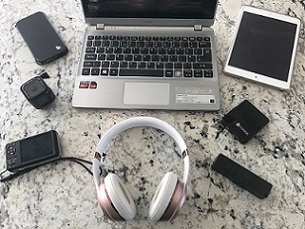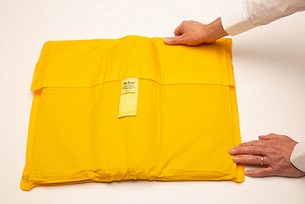 None of these everyday electronic devices should go in checked luggage in airplane holds
None of these everyday electronic devices should go in checked luggage in airplane holds
 An AvSax lithium battery mitigation bag
An AvSax lithium battery mitigation bag
 Environmental Defence Systems Ltd managing director Richard Bailey who invented the AvSax
Environmental Defence Systems Ltd managing director Richard Bailey who invented the AvSax
Personal electronic devices powered by lithium batteries should NEVER be put in aircraft holds as checked luggage … and the danger of doing so has just been graphically illustrated by a fire on board a plane.
A Congo Airways plane on an internal flight from Goma to Kinshasa in the Democratic Republic of Congo was climbing out of Goma on June 18, 2024, when the crew were alerted to a cargo hold smoke indication.
They made the quick-thinking decision to immediately return to Goma where emergency services found a suitcase showing signs of heat damage.
Further investigation discovered a power bank powered by a lithium battery which had gone into thermal runaway.
Thermal runaway is a rapid, uncontrolled chemical reaction within the battery that causes the internal temperature to rise. When one cell in a battery overheats it can produce enough heat - up to 900°C (1652°F) - to make adjacent cells overheat. This can cause a lithium battery fire to flare repeatedly and burns at such a high temperature fire suppression systems in cargo holds struggle to cope.
A report by the Federal Aviation Administration (FAA) which regulates American airline companies and US airspace said in a report: “The uncontrollability of lithium battery fires can ultimately negate the capability of current aircraft cargo fire suppression systems and can lead to a catastrophic failure of the airframe.”
This is why airlines now insist that passengers take all lithium batteries and their personal electronic devices such as mobile phones, iPads and laptops into the passenger compartment with them.
It’s so the cabin crew can react quickly with AvSax thermal battery fire mitigation bags should a device start to overheat and go into thermal runaway.
This can and does happen.
There have been 483 verified lithium battery incidents recorded by the FAA from March 2006 to April 2024 but figures have rocketed in recent years and have been running at an average around one a week since 2017.
The worst device by far for causing fires are portable battery chargers – also known as battery packs – which have sparked 201 incidents, as they did in this Congo Airways incident.
Second are vapes and e-cigarettes which together have caused 100 incidents even though people can’t even smoke on aircraft.
Mobile phones are third with 64 incidents and laptops fourth with 59.
These figures are just for the USA which suggests hundreds more incidents have happened elsewhere in the world but have never been reported. No other regulatory authority releases lithium battery incident figures, including the Civil Aviation Authority in the UK.
AvSax are now on board around 16,750 aircraft operated by more than 100 airline companies worldwide, including some of the best-known names in the aviation industry.
AvSax won the Queen’s Award for Enterprise in the UK for their innovation and were devised by Environmental Defence Systems Ltd (EDS) based in Huddersfield, Yorkshire, England. The Queen’s Award is the highest accolade any business can get.
EDS managing director Richard Bailey said: “I’m sure people have noticed that the potential danger of lithium batteries is now highlighted in the passenger safety briefing done by cabin crew before every flight.
“They will say that if your personal electronic device starts to overheat then you need to let the cabin crew know immediately. This is so they can get the device into the AvSax quickly and immediately eliminate the danger.
“Planes that don’t have AvSax often have to make diversions and emergency landings, costing the airline a lot of money and greatly inconveniencing passengers.
“Every time an AvSax has been deployed the plane has been able to continue its journey to its final scheduled destination.”
For more information on AvSax go to www.avsax.com